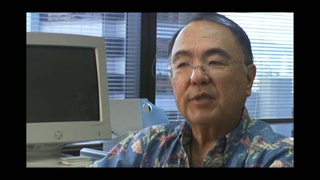Interviews
His testimony has more credibility because of his race
Being assigned to military intelligence gave me some credentials later on to say I was in military intelligence. There’s a certain mystique about that—actual or assumed—[which] nevertheless works in one’s favor.
And the other opportunity, besides meeting Aiko, was to meet other Nisei people with whom we’re still in contact. That helped because then I was able to flush out, to a great extent, the archival kind of material that we were running across. Then, I guess, being able to testify before [Congress], being able to prepare myself to testify with authority, required the knowledge and the skills—most of which were transferred to me from Aiko. With her assistance, I could go before the congressional committees and say with authority, with back-up material, with resources, what I was able to say.
Because I was not Japanese American, there was no doubt about my testimony. But if somebody else [a Nikkei] had said the same thing, if Seiichi Watanabe had [made a similar statement] under the same circumstances, with the same background as mine, it wouldn’t have carried the weight that I was able to present. [My testimony was acceptable] just because of my face [being a Caucasian].
Date: August 26, 1998
Location: Virginia, US
Interviewer: Darcie Iki, Mitchell Maki
Contributed by: Watase Media Arts Center, Japanese American National Museum
Explore More Videos

Not relating to Japan Americans' experiences on the mainland
(1923-2011) Lawyer, MIS veteran, founder of Francis and Sarah Sogi Foundation


Less information about Hawai‘i in mainland
(b.1944) Founder of Kobayashi Group, LLC

A teenager's memories of how a local newspaper misrepresented Japanese Americans
(b. 1925) Draft resister

The role of the media in influencing people's opinions
(b. 1925) Draft resister

Living conditions in prison while serving time for resisting the draft
(b. 1925) Draft resister

Talking to children about decision to resist the draft during World War II
(b. 1925) Draft resister

Reflecting on Japanese Americans' response to incarceration
(b. 1925) Draft resister


First learning about the incarceration experience in college
(b. 1955) Lawyer

Feeling angry upon reading of Supreme Court case, 'Korematsu v. United States'
(b. 1955) Lawyer

Reasons for conformity and competitiveness in Gardena, California
(b. 1946) Lawyer

Role of the redress movement in helping Nisei to open up about their wartime experiences
(b. 1946) Lawyer


